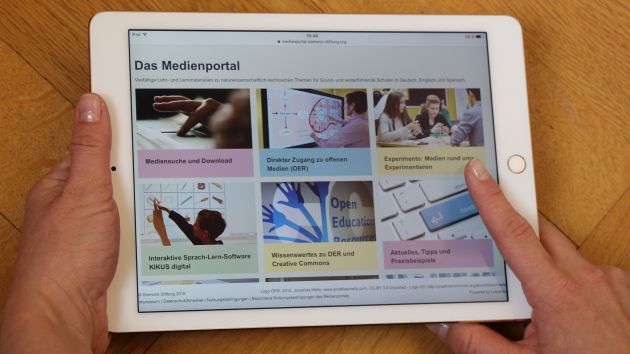How can teachers prepare science and technology topics in a realistic and exciting manner for inclusive classrooms? Siemens Stiftung and their cooperation partners offer an answer through the development and supply of exemplary inclusive experimentation units for the fifth through tenth grade. The materials are freely available as Open Educational Resources (OER) on the Siemens Stiftung’s media portal as well as on the state-run education servers from Berlin and Saxony-Anhalt.
The digital teaching and learning materials were developed together with the iMINT-Akademie of the Berlin Ministry for Education, Adolescents and Science and the State Institute for School Quality and Teacher Training in Saxony-Anhalt (LISA) and enable the differentiated and nevertheless shared exploration development of scientific-technical questions in diverse groups. They are based on things such as Experimento, Siemens Stiftung’s international educational program, as well as the standards for experimenting in inclusive instruction from the iMINT-Akademie. The project is receiving professional support from Professor Dr. Joachim Kahlert from the Psychology and Education Department and Professor Dr. Ulrich Heimlich from the Psychology and Didactics Department at the Ludwig-Maximilians-Universität in Munich.
A wide range of topics
A trip with the research vessel “Beagle” provides the framework for questions surrounding the topic “Substances in Everyday Life”. Just as in the case of the topic “From Senses to Measurements”, the materials were also developed by the iMINT-Akademie for the fifth and sixth grades. While the experimentation units developed by LISA for the seventh through tenth grades focus on the topics of energy, the environment and healthcare.
Context-oriented tasks, experimentation instructions, answer sheets and media modules create the basis for the individual promotion of students in inclusive STEM instruction, without relinquishing the classroom community. All students actively participate to the best of their abilities and, in doing so, contribute to setting tasks. As a result of this approach, learning process-related values such as team orientation, tolerance and sense of responsibility are brought to life in the classroom.
The inclusive materials tested in classrooms will be used for advanced teacher training in Berlin-Brandenburg and Saxony-Anhalt, respectively. Furthermore, the development continues – the inclusive learning environments for the fifth and sixth grades will be expanded for specific support needs, such as for students who have linguistic deficits.



